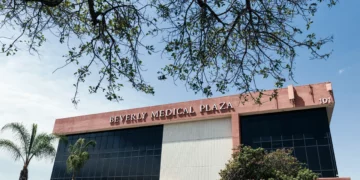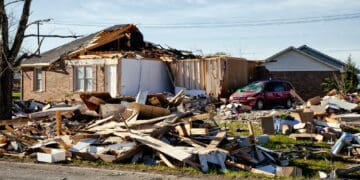- Maintaining Your Home's Condition
- Use Your House As Your Primary Residence
- You Must Continue To Pay Any Property Fees Promptly
- How To Communicate With Your Insurance Provider Following A Natural Disaster
- Tip: Be Wary Of Home Repair Scams Following a Natural Disaster
- Facing Foreclosure? Where To Turn For Help
- How to Get Reverse Mortgage Assistance After A Natural Disaster
Following a natural disaster, you can endure house damage, unforeseen bills, and an abrupt loss of income. Here are some tips for keeping up with your reverse mortgage payments while recovering from a natural disaster.
Maintaining Your Home’s Condition
If a natural disaster caused damage to your home:
- Submit an insurance claim as soon as possible; you may need to do so within a particular time frame following a catastrophe.
- Send a certified-letter notification of the damage to your lender or servicer. Copy the letter, and keep it.
- Document the damage with photos or videos to support your insurance claim. Do this both before and after making any repairs.
- If your residence is in a major disaster that the president has declared, apply for financial help through the Federal Emergency Management Agency (FEMA). You can check your eligibility and submit an application for aid at DisasterAssistance.gov or by calling 800-621-3362 or 800-462-7585. (TTY).
- Get in touch with your state emergency management office to learn about additional assistance. To find your state office, go to fema.gov/emergency-management-agency.
Use Your House As Your Primary Residence
If a natural disaster caused damage to your home that prevents you from living there:
- Inform your lender or servicer in writing that you intend to return once your home is repaired. Use certified mail to send your notice.
- Give your lender or servicer the most recent version of your contact information, including a forwarding address, email address, and phone number.
You Must Continue To Pay Any Property Fees Promptly
If a natural calamity prevents you from paying your property fees:
- Consult your local tax authorities to see if any options are available, such as the ability to postpone tax filing deadlines, pay in installments, or avoid penalties. Then, inform your servicer if you choose one of these choices.
- Speak with Area Agencies on Aging (AAA) to learn about federal, state, and local assistance programs that could help you cover unpaid property taxes. Call 800-677-1116 or go to eldercare.acl.gov to find the local AAA.
- Get in touch with your lender or servicer as soon as you can if you miss a payment. Your lender or servicer may use your monthly loan payment or line of credit to pay your property fees.
- Inquire about your alternatives with your lender or loan servicer if your loan is in default. Check to see whether your lender or servicer offers unique “hardship” options or repayment schedule choices for victims of disasters.
- Inquire about an “at-risk extension” from your servicer. For example, suppose you are 80 or older and are dealing with severe conditions, such as a long-term disability or terminal disease. In that case, this may assist you in postponing a foreclosure.
How To Communicate With Your Insurance Provider Following A Natural Disaster
- If your insurance policy covers the damage, your insurance provider will send a check to the lender as the payee or to you and the lender jointly. If you receive a joint check, get the address to send it to from your lender or servicer by getting in touch with them.
- If the expected cost of repairs exceeds your coverage, you may be able to pay for required repairs or repay the reverse mortgage loan. Many people use funds from their homeowners’ insurance and personal funds.
- Consult your lender or servicer to avoid foreclosure if you cannot pay the remaining balance on your loan. In addition, think about consulting a housing counselor or lawyer.
- Request the company’s justifications for the rejection of coverage or the existence of an appeals process if your insurer refuses to pay you what you feel you are entitled to.
- If you think your insurance provider improperly refused your coverage, you might want to see an attorney or submit a claim to your state’s insurance regulator.
Tip: Be Wary Of Home Repair Scams Following a Natural Disaster
- Avoid contractors who knock on doors; you shouldn’t feel compelled to make an immediate decision.
- Request estimates for the cost of the repairs from several contractors.
- Ensure written contracts reflect any verbal promises.
- FEMA can direct you to resources where you can report fraud cases and offer more information on home repair scams.
Facing Foreclosure? Where To Turn For Help
Most important piece of information first: Act without delay. Don’t disregard the threat of foreclosure.
If the U.S. Department of Housing and Urban Development (HUD) has extended the foreclosure timetable for your location, check with your lender or servicer. HUD occasionally demands foreclosure delays in areas where the president has declared a significant disaster.
Try to get your account current before the foreclosure process resumes if HUD extends the timetable for foreclosure in your location. Check the HUD website, contact your lender or servicer, or dial a HUD-approved housing counseling organization to learn when it restarts.
How to Get Reverse Mortgage Assistance After A Natural Disaster
- Speak with a lawyer. Legal aid may be able to provide you with free legal services. Visit the website of your local or state bar association if you need assistance finding a lawyer.
- Speak with a housing advisor. HUD-approved housing counseling organizations provide free or inexpensive professional assistance. You can find a housing consultant at hud.gov or by calling 800-569-4287.
- If you are having issues with your lender or servicer, file a complaint with the Consumer Financial Protection Bureau by visiting consumerfinance.gov or calling toll-free 855-411-CFPB (2372).
- Visit cfpb.gov/recover for more information on disaster-related topics.




















